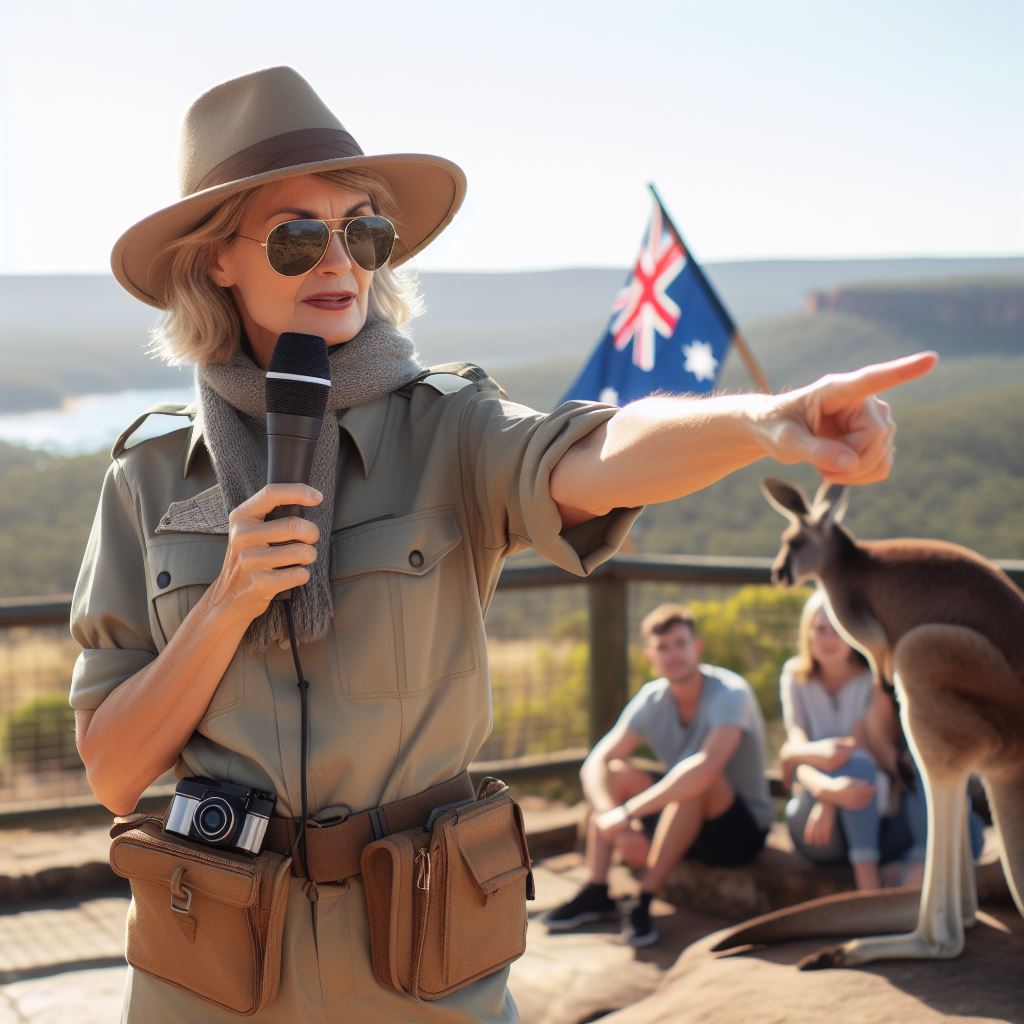Introduction
Welcome to our blog post on the top skills every tour guide must have.
In the competitive tour guiding industry, possessing specific skills is essential for excelling in this field.
Being a tour guide is not just about providing information to visitors.
It requires a combination of skills that enable guides to create memorable experiences for tourists and ensure their safety throughout the journey.
First and foremost, communication skills are crucial for tour guides.
They must be able to articulate information clearly and concisely, adapting their language to suit the needs and understanding of different individuals or groups.
Additionally, a tour guide should possess excellent interpersonal skills.
Building rapport with tourists is vital for creating a positive and engaging experience.
Guides must be friendly, approachable, and able to connect with people from diverse backgrounds.
A deep knowledge of the local area is another essential skill for tour guides.
They should be well-versed in the history, culture, and landmarks of the places they are guiding tourists through.
This knowledge allows guides to provide accurate and interesting information, enhancing the overall experience.
Leadership skills are also vital.
Tour guides must confidently lead groups, ensuring that everyone stays together and follows the tour schedule.
Being able to handle unexpected situations or emergencies calmly and efficiently is crucial for the safety and well-being of the tourists.
Lastly, flexibility and adaptability are necessary skills for tour guides.
Plans can change unexpectedly due to factors like weather conditions or unexpected closures.
Guides must be able to quickly adapt the itinerary and provide alternative activities or attractions to ensure tourists still have an enjoyable experience.
In essence, possessing specific skills is essential for tour guides to excel in the industry.
Communication, interpersonal, local knowledge, leadership, and flexibility are some of the top skills required to create memorable and enriching experiences for tourists.
Excellent Communication Skills
Tour guides play a crucial role in providing an exceptional experience for travelers.
They are responsible for sharing valuable information about the destination they are guiding, ensuring everyone’s safety, and creating memorable moments.
To be successful in this role, tour guides must possess a set of top skills, and one of the most important is excellent communication skills.
Effective communication is crucial for tour guides as it allows them to convey information clearly and accurately to their audience.
By articulating information in a concise and engaging manner, tour guides can provide travelers with a deeper understanding of the destination’s history, culture, and significance.
Their communication skills help create a meaningful connection between the travelers and the place they are visiting.
Importance of active listening and clear articulation
Active listening is an essential aspect of communication that every tour guide must master. By actively engaging with their audience, tour guides can better understand their travelers’ interests, questions, and concerns.
This enables them to tailor their narration and adapt their explanations accordingly, ensuring that the information provided is relevant and captivating.
Moreover, clear articulation is vital for effective communication. Tour guides must speak in a manner that is easily understandable to their audience, especially when dealing with travelers from diverse linguistic backgrounds.
Using simple language, avoiding jargon, and enunciating words clearly contribute to a smooth flow of information and prevent any misunderstanding.
Ability to adapt communication style for different audiences
In addition to excellent communication skills, tour guides must also possess the ability to adapt their communication style for different audiences.
They encounter a wide range of travelers, including families, solo travelers, elderly individuals, and people with disabilities. Each group has its own preferences and needs in terms of the way information is presented to them.
By understanding the characteristics of their audience, a skilled tour guide can adjust their tone, pace, and level of detail to cater to the specific requirements of each group.
Lists are a great way to summarize the importance of communication skills:
- Effective communication allows tour guides to convey information clearly and accurately.
- Active listening helps tour guides understand travelers’ interests and adapt their explanations accordingly.
- Clear articulation ensures that information is easily understandable to diverse audiences.
- Adapting communication style for different audiences helps meet their specific needs and preferences.
To conclude, excellent communication skills are an essential requirement for every tour guide. Through effective communication, tour guides can provide travelers with a meaningful, engaging, and memorable experience.
They must listen actively, articulate information clearly, and adapt their communication style to cater to the diverse needs of their audience.
By mastering these skills, tour guides can truly excel in their role and contribute to an unforgettable travel experience for every traveler they guide.
Read: The Rise of Female Chefs in Australia’s Kitchens
In-depth Knowledge
When it comes to being a tour guide, having in-depth knowledge is absolutely essential. It is not enough to simply know the basics; tour guides must have extensive knowledge about the destinations they are guiding.
Researching historical facts is a vital part of being a knowledgeable tour guide. Understanding the historical context of a destination allows guides to provide accurate and interesting information to their guests.
This can include important events, famous landmarks, and significant figures.
Cultural traditions are another crucial aspect that tour guides should be well-versed in.
Knowing about local customs and traditions allows guides to help visitors navigate cultural differences and engage with the local community in a respectful and appropriate manner.
In addition to historical and cultural knowledge, tour guides must also be familiar with the landmarks and attractions of the destination.
This includes knowing the best viewpoints, popular tourist spots, and lesser-known hidden gems. Being able to provide this information ensures that guests have a comprehensive understanding of the destination.
Need for continuous learning and staying updated on relevant information
The importance of continuous learning cannot be overstated for tour guides. The world is constantly changing, and staying updated on relevant information is necessary to provide accurate and up-to-date tours.
This can include learning about new attractions, changes in local regulations, or even emerging trends in the tourism industry.
To stay well-informed, tour guides should make use of various resources. This can include reading books, attending seminars or workshops, and even reaching out to local experts or professionals in related fields.
The more knowledge a tour guide can acquire, the better they will be able to enhance the experience for their guests.
Having in-depth knowledge not only helps tour guides provide a more enriching experience to their guests but also boosts their own confidence and credibility.
Guests rely on tour guides to be informative and reliable sources of information, and a knowledgeable guide can make a significant difference in their overall experience.
Your Personalized Career Strategy
Unlock your potential with tailored career consulting. Get clear, actionable steps designed for your success. Start now!
Get StartedIn summary, in-depth knowledge is an absolute must for tour guides. It enables them to provide accurate and interesting information, navigate cultural differences, and enhance the overall experience for their guests.
Continuous learning and staying updated on relevant information are essential to ensure that tour guides remain knowledgeable and credible in their profession.
Read: Eco-Friendly Travel: Agents Leading the Way
Flexibility and Adaptability
In the tour guiding profession, flexibility is not just a desirable quality, but an essential one. A successful tour guide understands that no two tours are the same, and being able to adapt to unexpected changes or situations is crucial.
Why Flexibility is Essential
- Meeting the diverse needs of travelers requires the ability to adjust plans accordingly.
- Flexibility allows tour guides to accommodate special requests and create personalized experiences.
- Being flexible helps maintain a positive and enjoyable atmosphere during the tour.
- Adapting to unforeseen circumstances ensures that the tour remains smooth and problem-free.
- Flexibility allows tour guides to take advantage of opportunities that arise on the spot.
- It shows professionalism and dedication, leaving a lasting impression on travelers.
However, flexibility is not limited to just adapting to unexpected changes. A skilled tour guide must also be able to accommodate different traveler preferences and needs.
The Need to Adapt to Unexpected Changes or Situations
- Weather conditions can change quickly, forcing adjustments to the itinerary to ensure travelers’ safety and comfort.
- Transportation delays or cancellations may require alternate routes or arrangements.
- Sudden closures or renovations of attractions may necessitate finding suitable alternatives.
- Health emergencies or unexpected illnesses among travelers may require immediate action and adjustments.
- Adjusting the pace of the tour to match the group’s energy levels is crucial for an enjoyable experience.
Having the ability to adapt to unexpected changes or situations demonstrates a tour guide’s preparedness and professionalism. It ensures that travelers have a seamless and memorable experience, even when things don’t go as planned.
Accommodating Different Traveler Preferences and Needs
Every traveler is unique, and a skilled tour guide acknowledges and respects these differences by adapting to their preferences and needs.
- Some travelers may prefer a more relaxed pace, while others may want a fast-paced and adventurous tour.
- Cultural differences and dietary restrictions should be considered when selecting meals or planning activities.
- Physical limitations or disabilities of certain travelers must be taken into account when designing the tour.
- Language barriers can be overcome by providing translation services or hiring multilingual guides.
- Being open to feedback and ready to make adjustments based on traveler preferences enhances customer satisfaction.
By accommodating different traveler preferences and needs, a tour guide creates a personalized and inclusive experience.
This not only ensures the enjoyment of the current tour but also leaves a positive impression, encouraging repeat business and referrals.
In general, the tour guiding profession demands a high level of flexibility and adaptability. Tour guides must be prepared to change plans on the fly, adjust to unexpected situations, and accommodate the diverse preferences and needs of their travelers.
By possessing these skills, a tour guide can provide exceptional experiences and create memories that last a lifetime.
Read: Salary Guide: Travel Agents in Australia

Organizational and Time Management Skills
In the tourism industry, being organized and managing time effectively are essential skills that every tour guide must possess.
A successful tour guide needs to have the ability to handle various tasks simultaneously while ensuring a smooth and efficient experience for their clients. Here are some reasons why organizational and time management skills are vital for tour guides:
Importance of Being Organized
- Being organized allows tour guides to stay on top of their responsibilities and provide a seamless experience for their clients.
- By keeping all necessary documents and information in order, tour guides can easily access and share them when needed.
- Organized tour guides are better prepared to handle unforeseen circumstances and emergencies.
- When tour guides are organized, they can allocate their time and resources efficiently, reducing stress and increasing productivity.
Effective Time Management
- Tour guides often have tight schedules with multiple activities and destinations to cover. Effective time management ensures that everything runs according to plan.
- By prioritizing tasks and setting realistic deadlines, tour guides can meet their commitments and avoid unnecessary delays or conflicts.
- Good time management skills enable tour guides to allocate enough time to each activity, ensuring that clients can experience and enjoy everything without feeling rushed.
- When tour guides manage their time well, they can also create opportunities to provide additional value-added experiences for their clients.
Creating Itineraries, Planning Logistics, and Coordinating Group Activities
- One of the primary responsibilities of a tour guide is to design and create itineraries that cater to their clients’ needs and preferences.
- An organized tour guide thoroughly plans logistics such as transportation, accommodation, meals, and attraction bookings in advance to ensure a smooth flow of the tour.
- Coordinating group activities requires effective communication and organizational skills to ensure that all participants are aware of the schedule and requirements.
- By efficiently managing these aspects, tour guides can provide a well-structured and enjoyable experience for their clients.
Handling Unexpected Delays or Issues Efficiently
- It is inevitable that unexpected delays or issues may arise during a tour, such as traffic jams, weather changes, or unforeseen circumstances.
- A skilled tour guide must possess the ability to handle such situations efficiently, making quick decisions and adapting the itinerary accordingly.
- By having a backup plan or alternative options prepared in advance, tour guides can minimize disruptions and ensure a seamless experience.
- The organizational and time management skills of a tour guide play a crucial role in managing unexpected situations without compromising the overall tour.
In a nutshell, organizational and time management skills are indispensable for tour guides.
These skills allow tour guides to maintain order and efficiency, create well-planned itineraries, coordinate group activities, and handle unexpected delays or issues effectively.
By mastering these essential skills, tour guides can deliver exceptional experiences and ensure the satisfaction of their clients.
Read: Travel Agents: The Future in Aussie Tourism
Uncover the Details: Tour Guide Life in Oz: Myths vs Reality
Problem-Solving Skills
To be a successful tour guide, one must possess a set of essential skills that go beyond just providing information to tourists. One such crucial skill is problem-solving.
Tour guides often encounter unexpected challenges during tours, and their ability to handle these situations effectively can greatly enhance the overall experience for their guests.
Stand Out with a Resume That Gets Results
Your career is worth more than a generic template. Let us craft a resume and cover letter that showcase your unique strengths and help you secure that dream job.
Get HiredExcellence in Problem-Solving
Tour guides need to be excellent problem solvers in order to ensure that their tours run smoothly.
They must be able to quickly identify and address any issues that may arise, whether it’s a delayed transportation, bad weather, or any other unforeseen circumstances. By doing so, they can minimize disruptions and keep the tour on track.
Quick Thinking
Thinking quickly on their feet is another crucial aspect of problem-solving for tour guides. They need to be able to come up with alternative solutions or adjustments on the spot to overcome any challenges that may come their way.
This includes finding alternative routes, adjusting schedules, or even arranging last-minute changes to the itinerary.
Remaining Calm and Composed
In stressful situations, it is of utmost importance for tour guides to remain calm and composed. Tourists look to them for guidance and support, and their ability to stay composed can help alleviate any anxiety or concerns among the group.
By staying calm, tour guides can think clearly and make effective decisions to address the problem at hand.
Effective Communication
Problem-solving is closely intertwined with effective communication. Tour guides must be able to communicate clearly and efficiently with both their guests and relevant parties involved, such as transportation providers or attraction staff.
By effectively conveying the challenges and seeking solutions, tour guides can ensure a smooth resolution.
Flexibility
Being flexible is another key aspect of problem-solving for tour guides. They must be able to adapt their plans or itineraries based on the situation at hand.
This flexibility allows them to find alternative activities or attractions that can still provide an enjoyable experience for the tourists, even if there are unexpected changes or disruptions.
Attention to Detail
Having a keen attention to detail is vital in problem-solving as a tour guide. By paying close attention to the small details, they can anticipate potential issues before they arise.
This proactive approach enables them to come up with solutions or contingency plans in advance, ensuring a seamless and enjoyable tour experience for their guests.
Empathy and Customer Service
Problem-solving from the perspective of a tour guide also involves empathy and excellent customer service. They must be able to understand and empathize with the concerns of their guests.
By actively listening and addressing their needs and concerns, tour guides can provide solutions that go above and beyond mere problem-solving, creating a positive and memorable experience for their tourists.
Overall Impact
The problem-solving skills of a tour guide play a vital role in the success of their tours.
Being adept at quickly resolving challenges, remaining calm under pressure, and having effective communication can greatly enhance the experience of both the tourists and the guide.
It ensures that the tour proceeds smoothly, regardless of unexpected situations, and allows everyone to fully enjoy and appreciate the destination they are exploring.
So, if you are considering a career as a tour guide or looking for a guiding service, make sure to prioritize these problem-solving skills. They are the key to turning challenging situations into opportunities for a memorable and enjoyable tour experience.
Cultural Sensitivity and Empathy
In the tour guiding profession, cultural sensitivity holds immense significance. It is crucial for tour guides to understand and respect different cultural backgrounds, traditions, and values.
This skill allows them to create a positive and inclusive environment for all tourists.
Tour guides must possess the ability to relate to people from diverse backgrounds. They should be able to connect with tourists and show empathy towards their viewpoints and perspectives.
This helps in building rapport and fostering meaningful interactions throughout the tour.
Importance of promoting inclusivity and respect for all tourists
Promoting inclusivity is another important aspect of cultural sensitivity. Tour guides should ensure that all tourists, regardless of their cultural or ethnic backgrounds, feel welcomed and valued.
This can be achieved by embracing diversity, acknowledging cultural differences, and creating experiences that cater to a wide range of preferences and needs.
Respecting the customs and traditions of tourists is essential. Tour guides should be knowledgeable about the cultural norms and practices of different groups and should avoid any actions or statements that may offend or disrespect them.
Demonstrating respect for cultural diversity fosters a sense of appreciation and enhances the overall experience for tourists.
Benefits of being culturally sensitive and empathetic
Being culturally sensitive and empathetic also enables tour guides to effectively communicate with tourists.
They should possess excellent listening and communication skills to better understand the needs and expectations of tourists from diverse cultures.
By actively listening and empathizing, tour guides can adapt their approach and provide personalized experiences that meet the unique requirements of each tourist.
Cultural sensitivity and empathy positively impact the overall tour experience.
They contribute to creating a safe and inclusive space where tourists feel comfortable expressing themselves and engaging in meaningful conversations.
This leads to a deeper understanding and appreciation of different cultures and perspectives.
To develop cultural sensitivity and empathy, tour guides can engage in various activities.
Participating in cultural events, reading books or articles about different cultures, and actively seeking exposure to diverse communities can broaden their knowledge and understanding.
Furthermore, tour guides should continuously educate themselves about cultural practices and traditions relevant to their destinations.
In review, cultural sensitivity and empathy are critical skills that every tour guide must possess.
These skills allow tour guides to connect with tourists from diverse backgrounds, promote inclusivity, and respect cultural diversity.
By fostering a welcoming and inclusive environment, tour guides can provide memorable and enriching experiences for all tourists.
Continuous learning and embracing cultural differences are key in becoming a proficient and successful tour guide.
Transform Your LinkedIn for Maximum Impact
Elevate your professional brand with a LinkedIn profile that attracts recruiters, showcases your expertise, and maximizes opportunities. Stand out in your industry with a profile built for success.
Boost ProfileUncover the Details: Event Coordinators: Skills You Need in 2024!
Explore Further: Interviews with Top Australian Bartenders
Conclusion
In closing, being a successful tour guide requires a range of key skills.
These skills include strong communication abilities, in-depth knowledge of the subject matter, excellent organizational skills, and the ability to handle unexpected situations.
Aspiring tour guides should develop these skills through dedicated training and experience.
Mastering these skills can lead to a rewarding career in tour guiding.
The profession offers the opportunity to meet new people, explore different cultures, and share knowledge with others.
By mastering these skills, tour guides can provide an enriching and enjoyable experience for their clients, leaving a lasting impression.
So, if you have a passion for travel, a thirst for knowledge, and a love for meeting new people, pursuing a career as a tour guide can be highly fulfilling.
With the right skills and dedication, you can embark on a profession that allows you to travel the world, share your expertise, and make a positive impact on others’ travel experiences.




